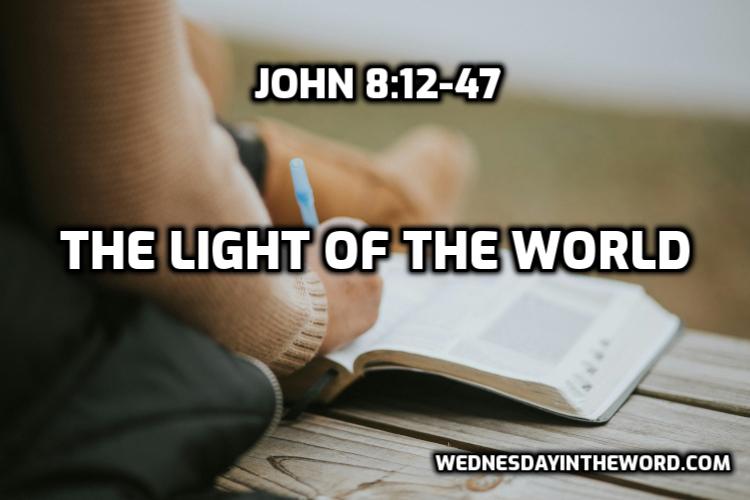The Light of the World (John 8:12-47)
Jesus came to offer his life to free us from the condemnation that we deserve. In John 8, Jesus tells us he also came to free us from slavery to sin.
Review—The Light of the World
The thesis of John’s gospel is the only way to gain eternal life in the kingdom of heaven is to believe Jesus is the Christ. John chose certain aspects of the ministry of Jesus to highlight certain themes.
- Theme 1: The importance of testimony. Why should we believe what we haven’t seen for ourselves? We believe because of the testimony of those who saw it.
- Theme 2: The only way to receive eternal life is to believe in Jesus. What’s the point of all this testimony? That we believe in Jesus. Why is believing in Jesus so important? Because he’s the only one who can grant us eternal life.
- Theme 3: Those who believe do so because of the activity of the Spirit of God. We don’t manufacture belief. The Spirit gives it to us.
The Light of the World (John 8:12-30)
- We can’t see in the dark. We stumble because we can’t see obstacles in our path. We get lost because we can’t find familiar landmarks.
- In this analogy, we human beings are stumbling in the darkness of ignorance and lies. We lack the light of truth and understanding.
- Jesus came to bring us the understanding that leads to eternal life.
- To die in your sins means to die without dealing with the problem of your guilt. You are guilty, and you will reap what you sowed. If you reject Jesus, this is your fate.
- Jesus told the Pharisees they would soon see another reason to believe he’s the Messiah: the resurrection.
- When they finally have Jesus executed, the Pharisees believe they have silenced him forever.
- Ironically, his execution is the very means that he ends up triumphing over them because God resurrects him and crowns him king of kings.
Slaves and sons (John 8:30-36)
- If we’re honest with ourselves, we realize are slaves to a brutal master: sin.
- Jesus claims not only can he pay the penalty for our sins and reconcile us to God, he can break the chains of our slavery to sin.
- It’s not enough to hear and claim to believe. Faith requires remaining as his disciple.
- Families had a ranking system. The father was the head of the household. The eldest son came next with the slaves at the bottom.
- Family members remained in the household. Slaves could be sold or traded.
- Our slavery to sin means we don’t belong in God’s household.
- But if the eldest son raises a slave to the status of brother, the slave was free indeed.
- Being physical descendants of Abraham doesn’t give them the right to belong to the household of God. They need to recognize they are slaves of sin and look to Jesus for deliverance.
- Jesus offers a great hope here. But that hope depends on accepting the fact that we’re slaves to sin.
Fathers and Children (John 8:37-50)
- Two aspects of their behavior indicate they have a different father: 1) They don’t believe the message; 2) They want to kill the messenger.
- Abraham welcomed angelic messengers from God, gave gifts to the priest of God, Melchizedek, and believed the promises God made to him.
- Unbelief and murder do not characterize the children of God. Unbelief and murder characterize the children of Satan.
Once we understand the deep and terrible consequences of our slavery to sin, we understand why salvation is so wonderful and why being set free is such a big deal. Jesus says here, he came to bring us that freedom.
Please listen to the podcast for more detail and explanation.
Next: 17 Before Abraham was, I Am (John 8:48-59)
Previous: 15 The Woman Caught in Adultery (John 7:53-8:11)
Series: Gospel of John: Believe and Find Life
Study: Gospel of John Bible Study Resources
Podcast season 25, episode 16
Page Views: 322
